Vasily Botylev. On the way to the legend
Flaming night from February 3 to 4, 1943. Tsemess bay boils from explosions of shells and mines. The coast is shrouded in a hellish web of traces of tracer bullets, and the glow of fires can be seen for tens of kilometers. Major Kunikov, clinging to the bridgehead with his hands and teeth, expects a second wave of landing. At half-past four in the night ships docked in a hail of hail. One of the first to jump into the seething icy water was a stately officer, who with his equanimous look carried the fighters behind him. In his stern, focused face, carved like an ax, lit by the glow of battle, nothing betrayed the 22-year-old guy.
The officer’s name was Vasily Andreyevich Botylev. He will meet his 23rd birthday in the trenches of the Lesser Land under the hurricane fire of German artillery and aviation.
From Moscow to the Black Sea
Vasily Botylev was born in the modest working village of Rublevo (which was not yet a microdistrict of our capital) on February 24, 1920. As a child, the future formidable battalion commander of the 393rd Separate Marine Battalion dreamed of the sea, which was not even close to the continuation of the work of parents - simple artisans.
After graduating from school, Botylev in 1938 entered the Black Sea Naval School in Sevastopol, the future hero city. Even then, Vasily was characterized by crystal honesty and sometimes rigid straightforwardness. He graduated from the college Botylev with the rank of lieutenant and was immediately sent to the Black Sea Fleet in the Marine Corps unit. It was 1941, and the war was about to fall on the Soviet Union.
And then the date hit on a bloody thunder: June 22nd. The first baptism of fire of Botylev took place in October. At that moment, Vasily commanded a machine-gun platoon of the 8th Marine Brigade. He was one of those who in the forefront met the assault of Sevastopol by the Nazis. But no matter how the marines resisted, the front rolled back east.
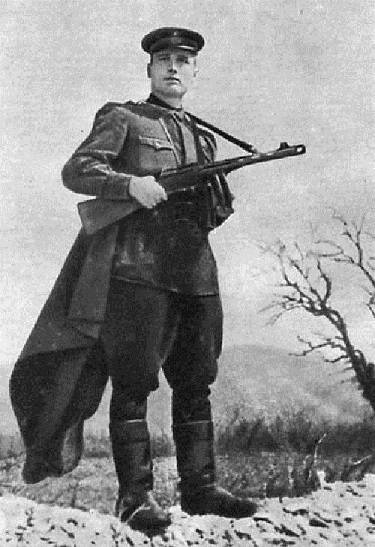
In December 1941, Botylev participated in the Kerch-Feodosia landing operation. During those battles, Vasily was injured in the head. Despite this, the unstoppable lieutenant with a hastily bandaged head continued to lead the battle, displaying extraordinary composure, which, of course, was transmitted to the soldiers. For skillful and decisive command Vasily Andreyevich was awarded the Order of the Red Banner.
After fierce battles in the Crimea, Botyleva was sent to guard Yeysk port, where soon his unit and other troops were almost blocked and made their way to the Black Sea in the direction of Novorossiysk with fights.
Disruption of Operation Scorpio
In Novorossiysk Botylev was already promoted to senior lieutenant. The fierce battles were taking place at the walls of cement plants. The bone in the Nazi throat was not only the Soviet fighters on the eastern side of the bay, but also the artillerymen of the legendary Zubkov, nicknamed the “Novorossiysk traffic controller” for the ability to smash any German car that appeared on the streets of Novorossiysk with an accurate shot. In the daytime, the Nazis even stopped the movement of troops and equipment. Zubkov’s battery was bombed and fired daily. The intensity and density of the fire was such that one day a German shell hit the barrel of the battery gun # 3 and turned it right in the middle. But all this could not silence the battery.
Soon, the command appeared that the Germans were preparing a landing operation with the goal of destroying the obstinate battery and its garrison. It was necessary to immediately strengthen the PDO in the area of Cape Penai and Kabardinka, i.e. on the first section of the anti-landing defense of the Novorossiysk naval base, but the people, and even people with experience, the base was not rich. Therefore, the defense of this sector was entrusted to senior lieutenant Botylev at the head of a company of machine gunners.
The Nazis were actually preparing an assault in the Penai area. The operation received the name "Scorpio." The purpose of the operation was to capture the Zubkov’s battery by landing from the sea, and if you can’t hold positions, destroy everything. If the breakthrough was a success, then it was planned to land the second echelon of landing on this section and try to simultaneously remove from the rear and from the front the Soviet defense of the eastern side of the bay.
On October 28, 1942, before midnight, the Germans, using a Schnellboot type torpedo boat, began reconnaissance of firing points of defense from Penay to Cape Doob. Following this, the enemy aircraft bombarded Kabardinka in order to divert attention. At 23:30, Botylev’s fighters discovered a group of enemy boats (from 20 to 30 boats and motor boats). The lieutenant gave the order to lie low and let the enemy go a couple hundred meters from the coast.
As soon as the Nazis came to the necessary distance, an avalanche of fire fell upon them. However, three boats still managed to land troops in fifty people ... who instantly jumped into a minefield. As a result, they all remained lying on a rocky shore in the Penaya area. Nesolon slurring at 23:50 the enemy retreated on boats, heading for the Myskhako area. The damage of the Soviet troops was ridiculous - a broken spotlight. The main disappointment for the PDO Botylev fighters and Zubkov’s battery was the cancellation of the concert of Arkady Raikin, which was planned just for that evening, when the intensity of the shelling usually decreased.
As part of the Kunikov squad
At the end of 1942, there was a rumor on the stock market that a major operation was being prepared. Soon, Major Caesar Lvovich Kunikov was instructed to assemble and train a special landing squad, which was to play a distracting role, and if successful, to connect with the main forces. Kunikov got down to business with all his decisiveness and even insisted on preparing a second wave of landing, convincing the command that his squad would take up a bridgehead, but the question of retaining a bridgehead remained open.
All fighters of the group, including officers, underwent a kind of personal interview with the landing commander. Caesar Lvovich preferred only veterans of Sevastopol, Odessa and the landing operations of the Crimea. At 22, Botylev was already considered a veteran. Having handed over the PDO cases of the first section of the NLMB to the NKVD units, Vasily Andreyevich joined the ranks of the legendary landing.
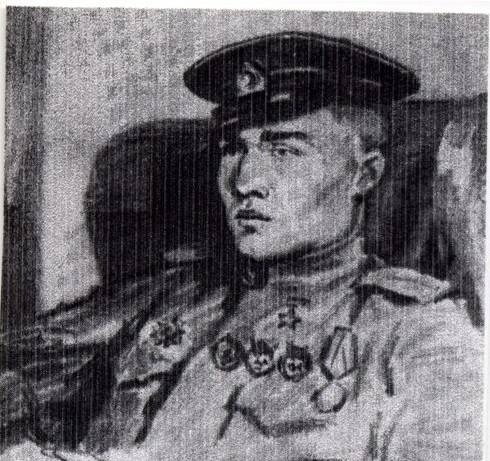
Fighters of the Botylev detachment also began to attend the Kunikovo school. The Marines regularly took ice baths in January in the Gelendzhik Bay, disembarking from boats, trained to overcome coastal cliffs, acquired knife fighting skills, learned the basics of mine action and took an accelerated course of a medical examiner. Kunikov even ensured that the command allocated all available German weapons for training the first and second waves of the landing. The officers of the Kunikovo detachment eventually got to study the whole German Pak 40 anti-tank gun.
According to the plan outlined by Kunikov, Senior Lieutenant Botylev took command of the detachment of the second wave of landing. Moreover, the second wave was no easier than the first, if not heavier. The first wave could count on the effect of surprise. In addition, part of the enemy’s PDO was Romanian troops, whose “valor” was most often realized in punitive operations, looting and robbery of the local population. Therefore, even then it was clear that the second wave would be expected by the targeted artillery and the German, and not the Romanian, units.
Senior Lieutenant Botylev at half past three in the morning of February 4, 1943, together with a reinforced company of marines, was waist-deep in ice water on the shore near the city of Novorossiysk in the Stanichka area. Botylev’s detachment rushed frantically to expand the bridgehead. The unstoppable "black death" literally grinded hundreds of Nazis in a day and reached the line of Levanevsky Street (now Chernyakhovsky Boulevard), which was a mile from the original landing point, although the Hitlerites had mobilized by this time all the units that they could, except for the daily aviation strokes.
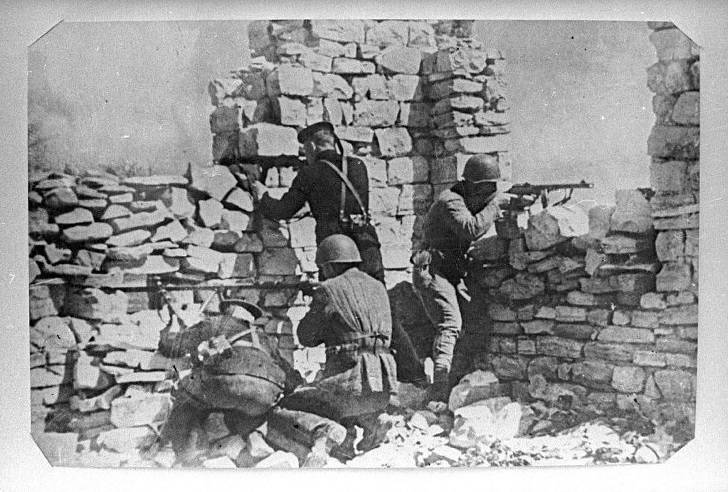
By the way, the material symbol of these fierce Nazi attacks was the “Explosion” monument in Myskhako, built from the same amount of dangerous metal that the Germans dropped on every fighter of the Lesser Land. Now it is hard to fit into the consciousness of modern man.
Dash forward and feat of Kornitsky
By the fifth (according to other sources, by the seventh) February, Botylev with his detachment went to high school No. 22, occupied by the Nazis. The Nazis turned the strong three-story school building into a fortress, and one infantry division, two Romanian battalions and an SS unit were already pulled to the bridgehead captured by our soldiers, not counting artillery and armored vehicles driven into the old cemetery area to strike on Malaya Zemlya.
On the move, Botylev captured the first floor and was preparing to storm the second, because the Nazis still remained on the second and third floors. But it was at that moment that the Germans brought armored vehicles to the battlefield. And due to the fact that the advance detachment of Botylev too deeply penetrated the German defense in urban conditions, the fighters were cut off from the main forces of Major Kunikov. At that moment, Junior Sergeant Mikhail Kornitsky stepped into immortality.
Here is how the famous sailor Vladimir Kaida describes it (in one of Kaida’s fights, with a fist punch on the German helmet he sent the latter to the next world, and the second one broke his neck with the same punch, but in the face):
Being in school did not make sense. Botylev ordered to leave school, break out of the environment. The first rushed Michael Kornitsky. Having jumped out of the school corridor, with a well-aimed throw of an anti-tank grenade, he knocked out a fascist tank, another car quickly disappeared into an alley.
Because of the stone fence, helmets of fascist submachine guns appeared. We realized there was an ambush. Kornitsky tore off the second anti-tank grenade from his belt, jumped onto the wall of a stone fence, behind which enemy machine gunners had accumulated, and rushed into the thick of the Nazis.
There was a deafening explosion - detonated grenades hanging on Kornitsky’s belt.
Taking advantage of the confusion of the Nazis, Botylev shouted:
- Follow me!
Firing from machine guns and machine guns, throwing grenades against the Nazis, we made a breakthrough.
Breaking out of the environment, Botylev decided to get around the school from the flanks. Regrouping his forces, he ordered two red rockets to be sent towards the city — the signal and the direction of the advance of the group.
In the midst of the attack, the orderly of Major Kunikov Lenya Khobotov ran up to him with a note from the squad commander: “You don’t need to take school, take up only defense. Our task is to hold out until the evening. Now they press on us on the left. There is no ammunition. Save and take away the ammunition from the enemy. "
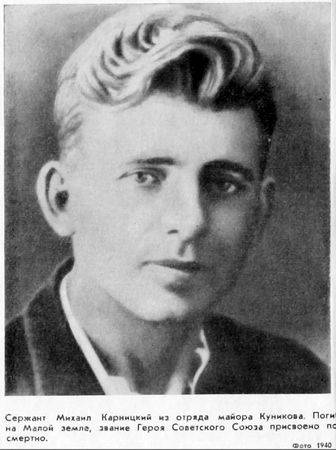
Kornitsky was posthumously awarded the title Hero of the Soviet Union. Vladimir Kaida survived in the meat grinder of Malaya Zemlya, and in 1970, having received an apartment in Novorossiysk on Geroyev Desantnikov Street, he returned “home”. Kaida has always participated in parades and in the public life of the city, along with all veterans; he is also remembered at the patriotic events by the author’s mother.
However, we will return in 1943. On February 8, the Nazis concentrated more than significant forces against the villagers, whose forces were constantly increasing due to night-time transfers of reinforcements. Here were units of the 73rd Division, and the 305th Grenadier Regiment of the 198th Division, which lost part of its composition on the approach to the bridgehead due to the successful work of our gunners, and the 125th Infantry Division, deployed from Krasnodar, and the mountain shooters of the 4th division come from Austria and Bavaria, and again the notorious Romanians - from three to four regiments, etc.
Botylev and his fighters took up the defense, day and night, repelling the attacks, but under these conditions, 22-year-old Vasily Andreevich could not even think that the most desperate battle awaits him only ahead.
To be continued ...
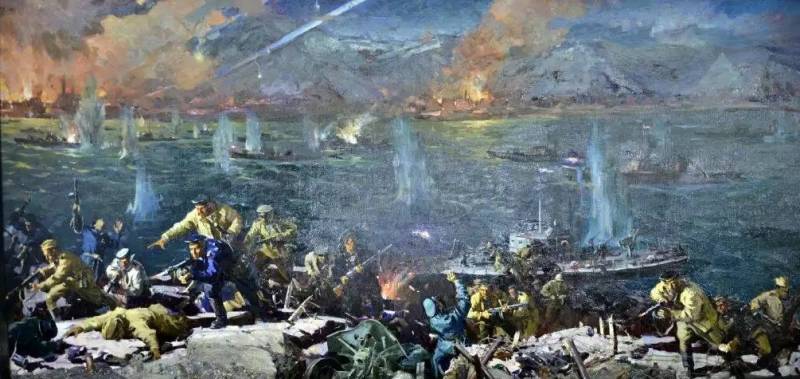
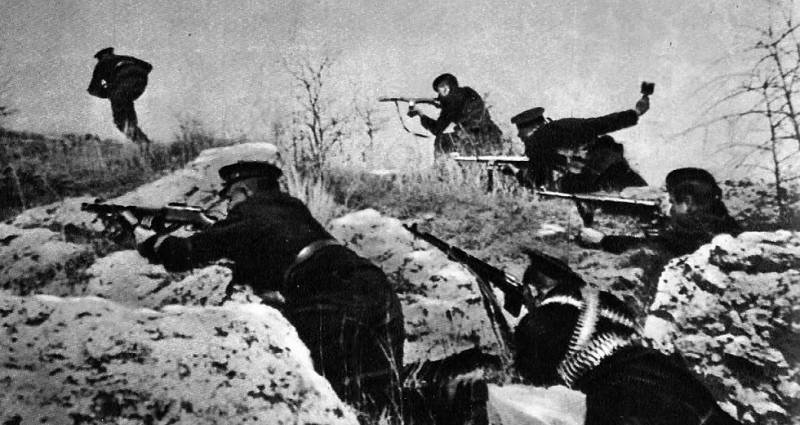
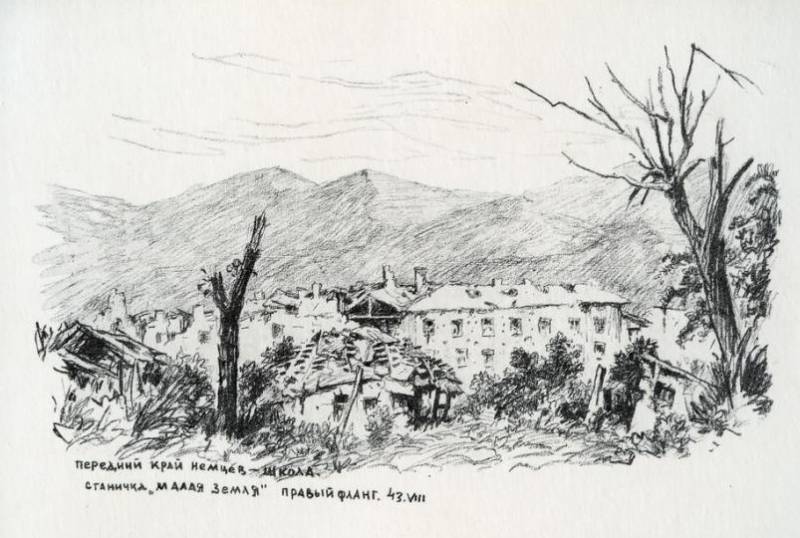
Information